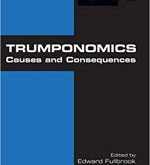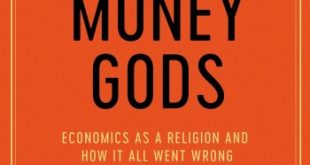from Edward Fullbrook It seems generally agreed that populism tends to rise up after a prolonged period in which governing elites have blocked from public discussion the declining economic welfare of a significant proportion of the population. These declines take two forms, usually simultaneously and interdependently: A decline of income and wealth in absolute terms and/or relative to the elites and their agents. A decline in key characteristics of employment through time (quality,...
Read More »Economics as religion?
from David Ruccio Mainstream economists have been taking quite a beating in recent years. They failed, in the first instance, with respect to the spectacular crash of 2007-08. Not only did they not predict the crash, they didn’t even include the possibility of such an event in their models. Nor, of course, did they have much to offer in terms of explanations of why it occurred or appropriate policies once it did happen. More recently, the advice of mainstream economists has been...
Read More »Adam Smith & the Invisible Hand
from Asad Zaman In response to a comment by David Chester regarding Adam Smith and the Invisible Hand, I am reproducing the section in the paper which deals with this issue. This answers his question about how what is attributed to Adam Smith differs from what he actually said. [Excerpt from the paper: Failures of the Invisible Hand] Section 6: Recent Vintage of the Invisible Hand The main goal of this section is to show that the modern interpretation of the IH is relatively recent. The...
Read More »Are methodological discussions risky?
from Lars Syll Most mainstream economists are reluctant to have a methodological discussion. They usually think it’s too ‘risky.’ Well, maybe it is. But on the other hand, if we’re not prepared to take that risk, economics can’t progress, as Tony Lawson forcefully argues in his Essays on the Nature and State of Modern Economics: Twenty common myths and/or fallacies of modern economics 1. The widely observed crisis of the modern economics discipline turns on problems that originate at the...
Read More »Apologies not accepted
from Peter Radford OK, let me get back to it: I have just read a set of short papers over at a journal aptly named Democracy. The papers are held together under the banner:Symposium: has Economics Failed Us? Naturally that question was sufficient to get my attention, but reading through the material was so depressing. Why? Because there was Jason Furman offering a defense that has all the hallmarks of an economics profession steadfastly denying its own reality. Dean Baker was brilliant in...
Read More »Inequality and climate change
from David Ruccio The effects of climate change are, as we know, distributed unequally across locations. Therefore, the damages from climate change—in terms of agriculture, crime, coastal storms, energy, human mortality, and labor—are expected to increase world inequality, by generating a large transfer of value northward and westward from poor to rich countries. What about within countries—specifically, the United States? A new report, published in Science, predicts the United States...
Read More »Economics as a religion
from Lars Syll Contrary to the tenets of orthodox economists, contemporary research suggests that, rather than seeking always to maximise our personal gain, humans still remain reasonably altruistic and selfless. Nor is it clear that the endless accumulation of wealth always makes us happier. And when we do make decisions, especially those to do with matters of principle, we seem not to engage in the sort of rational “utility-maximizing” calculus that orthodox economic models take as a...
Read More »Women at work: global highlights
from Maria Alejandra Madi The roots of gender and poverty studies began with Pearce (1978) who coined the expression ‘feminization of poverty’. Pearce considered female-headed families, excluding poor women who live in male- headed families, based on the argument that the proportion of families headed by women among the poor has been increasing since the 1950s. In her opinion, women have become poorer because of their gender. The recent dynamics of the global labour market has reinforced...
Read More »Modern economists: The Inept Firefighters’ Club
from Dean Baker Suppose that our fire department was staffed with out-of-shape incompetents who didn’t know how to handle a fire hose. That would be really bad news, but it wouldn’t be obvious most of the time because we don’t often see major fires. The inadequacy of the fire department would become apparent only when a major fire hit and we were left with a vast amount of unnecessary death and destruction. This is essentially the story of modern economics. The problem is not that modern...
Read More »Rocking the boat
from David Ruccio As I argued a couple of days ago, recent events—such as Brexit, Donald Trump’s presidency, and the rise of Bernie Sanders and Jeremy Corbyn—have surprised many experts and shaken up the existing common sense. In short, they’ve rocked the neoliberal boat. The question is, where does this leave us? Thomas Edsall thinks it means we’ve reached the end of class-based politics. I’m not convinced. Yes, the response to the problems with neoliberal globalization has challenged...
Read More » Real-World Economics Review
Real-World Economics Review





